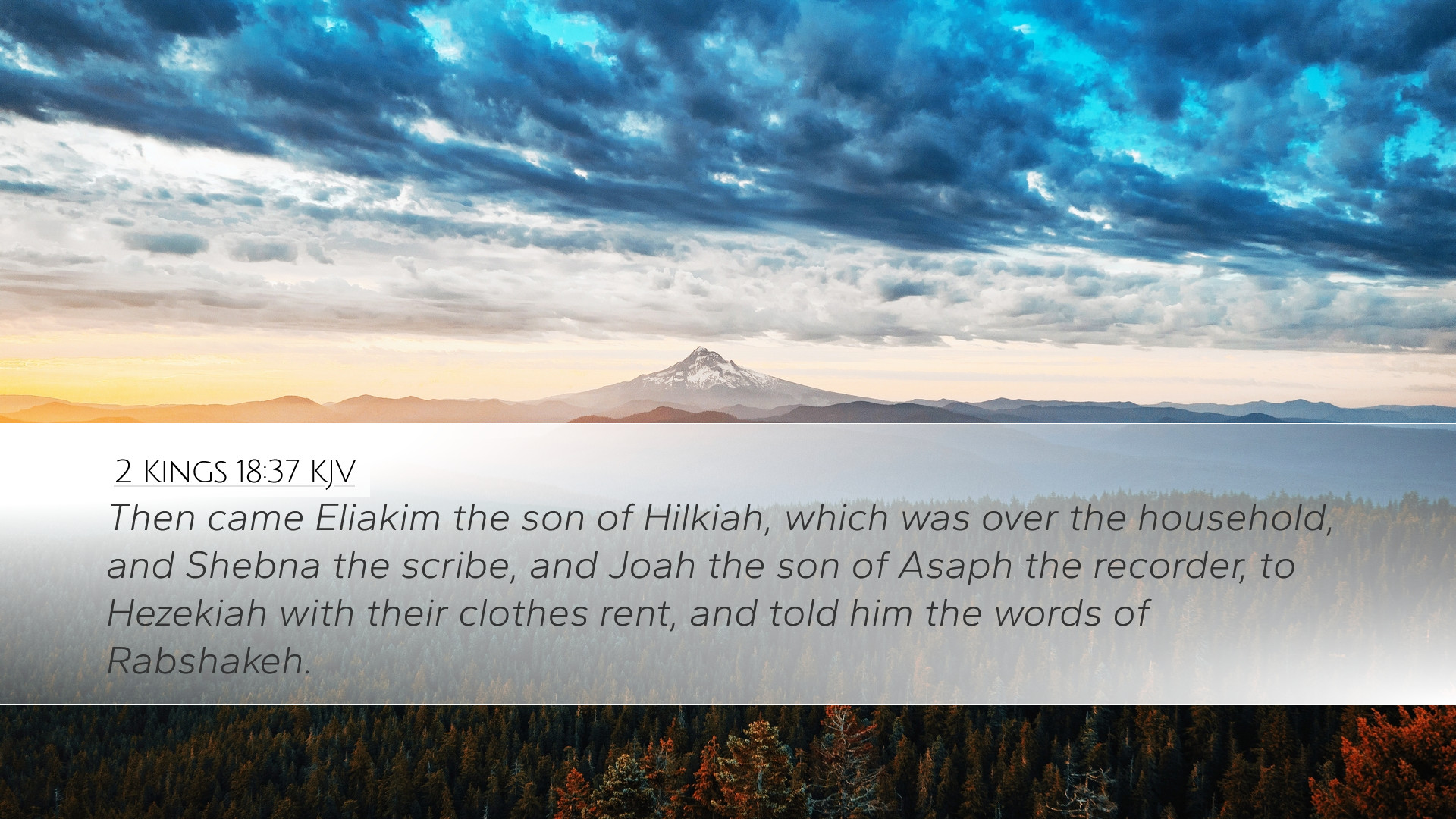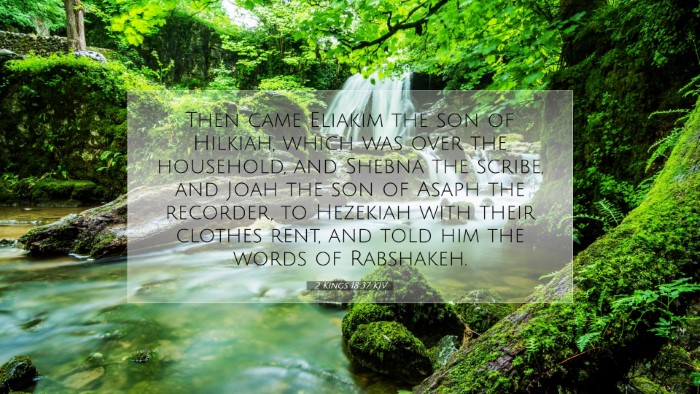Commentary on 2 Kings 18:37
Verse: “Then came Eliakim, the son of Hilkiah, which was over the household, and Shebna the scribe, and Joah, the son of Asaph, the recorder, to Hezekiah with their clothes rent, and told him the words of Rabshakeh.”
Introduction
This verse forms part of a larger narrative concerning the Assyrian siege of Jerusalem during King Hezekiah's reign. It highlights the anxiety and despair that engulfed Hezekiah's officials in response to the taunting words of the Assyrian officials, particularly Rabshakeh. The context addresses themes of communication, authority, and divine intervention.
Contextual Analysis
To fully appreciate the significance of 2 Kings 18:37, it’s essential to examine the broader historical and theological context in which it resides. Hezekiah’s reign represents a poignant time of crisis for Judah as the Assyrian Empire, under King Sennacherib, posed a formidable threat.
Historical Background
During this period, the Assyrians had established themselves as a dominant military power. Rabshakeh, the Assyrian's chief spokesman, delivered a message that sought to undermine the confidence of the Jerusalemites, promoting surrender by disparaging their faith in God and their alliances with other nations. This moment is emblematic of the struggles faced by the people of Judah in maintaining their identity and faith amidst external pressures.
Analysis of Characters
Hezekiah
King Hezekiah is noted for his religious reforms and attempts to restore proper worship in Judah. His actions were aimed at consolidating the people's faith amidst impending doom. His response to the Assyrian threat is indicative of his reliance on God over military might, a central theme in the narrative.
Eliakim, Shebna, and Joah
The presence of Eliakim, Shebna, and Joah is significant as they represent the official channels of communication between the king and his people. Their actions of tearing their clothes symbolize deep mourning and distress, a customary sign of lamentation in ancient Israel. This act conveys the gravity of Rabshakeh’s threats and the uncertainty surrounding Jerusalem’s fate.
Spiritual Insights
The Weight of Authority
The roles of Eliakim and Shebna are particularly instructive in understanding the burden of leadership. Albert Barnes notes that the tearing of their clothes was not merely an emotional reaction but a public display of their recognition of a dire situation. Leaders today must similarly navigate crises with both wisdom and an acknowledgment of the gravity of their decisions.
Faith Amidst Adversity
Hezekiah’s reign, marked by righteousness and a keen concern for the spiritual well-being of his people, invites us to consider our responses in moments of crisis. Matthew Henry emphasizes that “faith will stand when fear and extremity arise.” The verse serves as a reminder of the importance of turning to God in troubling times, demonstrating that divine assistance is sought before other methods.
Theological Reflections
The narrative surrounding 2 Kings 18:37 evokes theological discussions on the nature of God’s sovereignty, the human condition, and the practice of lament. The officials’ lamentation indicates an understanding of their helplessness without divine intervention. Adam Clarke asserts that this historical account presages the spiritual struggles faced by God’s people throughout the ages, reflecting the universal human experience of distress and the need for transcendent hope.
Implications for Prayer and Worship
This verse encourages contemporary believers to approach God with earnestness, recognizing both their vulnerability and His omnipotence. The act of lament, which is often overlooked in modern worship, is a powerful theme that deserves re-examination within church praxis. Pastors can draw from this narrative to guide their congregations in understanding that God listens in their moments of sorrow and despair.
Conclusion
In conclusion, 2 Kings 18:37 encapsulates a pivotal moment in the history of Judah, marked by despair yet underscored by an invincible hope in God. The reactions of Hezekiah’s officials serve as a profoundly human response to crises while inviting deeper theological reflection on leadership, faith, and divine intervention. For pastors, theologians, and students alike, this verse remains a compelling call to understand and practice faith in the face of daunting challenges.


